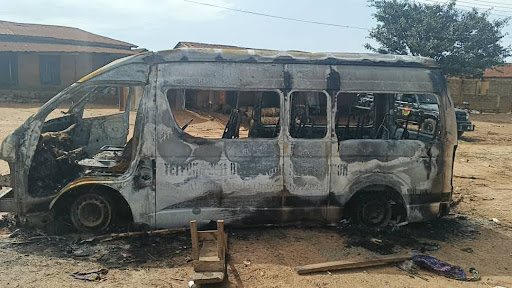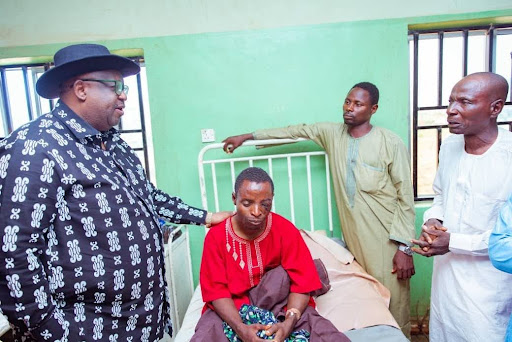Plateau Mob Action: When Identity Becomes a Death Sentence in Nigeria
Mob violence in Nigeria continues to be driven by ethnic and religious profiling, with deadly consequences for travellers in volatile regions like the North Central.

Bashar Abubakar embarked on a journey with his relatives and family friends from Basawa, a community in Zaria, northwestern Nigeria, on Friday, June 20.
The 52-year-old and his companions were heading for a wedding ceremony in the North Central region, specifically to the Qua’an Pan area of Plateau State. He had worked as a driver at the Ahmadu Bello University (ABU), Zaria, for about 15 years, and the bus belonged to the institution’s Department of Physics.
The passengers on board, including children, experienced a smooth journey until around 9:47 p.m. when they lost their way in Mangun, a district in Mangu Local Government Area (LGA), Plateau State, and stopped to ask for directions.
What followed was a nightmare.
A mob descended on the travellers. Thirteen people, including Bashar, were killed in the ensuing violence. Twenty others were rescued, many with injuries, according to the Plateau State Police Command. The bus was also set ablaze.
One survivor recounted that the mob first killed the driver, then turned on the other passengers, before nearby security operatives and other community leaders arrived and intervened.
“Bashar was a peaceful man who got along with everyone,” Malam Bala, a staff member in the physics department who narrowly missed joining the trip, told HumAngle.
On Tuesday, June 24, HumAngle visited the campus mosque where he regularly prayed. The imam described him as “a devout Muslim who made sure to attend the mosque’s activities.”
This was not Bashar’s first time travelling to Plateau State; his colleagues said he had made trips in the past, but this one would be his last. Bashar is survived by his wife and seven children, with his eldest recently graduating from secondary school.
He was among those laid to rest at the Hayi Muslim Cemetery in Mangu, while others were buried in Qua’an Pan, where they had hoped to celebrate a wedding, not mourn a tragedy.
The mob action on June 20 in Mangun is the second in four months in Nigeria, in which travellers were targeted based on their ethnic and religious affiliations. It adds to a worrying pattern of profiling-related violence, where identity alone is enough to provoke deadly responses. The attack, local security analysts say, was most likely motivated by ethnic and religious profiling. This is not an isolated incident.
The groom, Rabi’a Sani, told Daily Trust, the Nigerian newspaper, that he lost his father, two of his younger brothers, an uncle, and other loved ones in the incident. “My joy turned into anger, sorrow, and sadness. I am still grappling with the emotions of that day. I wonder if it was meant to be a day of joy or darkness,” the newspaper quoted him as saying.
Over the years, HumAngle has documented a rising trend of discrimination and armed violence triggered by profiling, particularly in states with entrenched ethno-religious fault lines.
In the last month, the Plateau State governor, Caleb Mutfwang, said, Mangun and other neighbouring communities, such as Chakfem and Mushere in Bokkos LGA, have “suffered coordinated terrorist assaults resulting in daily casualties and mass displacements.”
Only a day before the mob attack in Mangun, six people were killed in an armed attack in Chakfem. The attackers remain unidentified.
“In such volatile conditions, fear and suspicion often replace evidence, and innocent people become victims,” Nankpak Cirfat, a public affairs analyst, told HumAngle. “There is no justification for these acts. However, distrust between communities often creates fertile ground for misinformation, fear-driven reactions, and ultimately, violence.”
In Plateau State, a long history of intercommunal violence, mutual distrust, and cycles of reprisal has created an atmosphere where suspicion often precedes fact. This has given rise to an increasingly fractured society, particularly in Jos, the state capital, where residential patterns reflect deep divisions by practising a segregated kind of living where members of one religion live in one area and members of another religion live in the other.
“What the city battles with is segregated living, where people live among members of their religion. And if you don’t know Jos very well, you will cross those boundaries and behave inappropriately in perception, and it could earn you some negative response,” says Salis Muhammad Abdulsalam, founder of Face of Peace, a non-profit organisation in the state.
This polarisation has transformed everyday spaces, markets, roads, and neighbourhoods, into zones of invisible but dangerous boundaries. In such an environment, a traveller unfamiliar with local fault lines can unknowingly cross these boundaries and enter into an area reserved for one religion or demographic, like Bashar and his companions did, triggering hostility, particularly during periods of heightened tension.
In 2021, HumAngle examined the cause and impact of this polarisation in an extensive five-part series titled The Polarised City.

Four years ago, 26 travellers headed for Ondo State in the country’s South West were similarly killed in Jos North LGA. They were returning from an Islamic gathering in neighbouring Bauchi State. Locals said the massacre was a retaliation for ongoing attacks on farming communities in the nearby Bassa LGA. More recently, in March, vigilante groups and residents in Edo State’s Udune Efandion community attacked a group of hunters who were travelling through the community to Nigeria’s northern region. Several were killed and others injured. The incident, too, followed an earlier assault by suspected armed herders in a nearby settlement.
This suspicion is not confined to the streets; it is amplified online. A 2024 HumAngle investigation revealed how conspiracy-driven narratives circulating on social media, often deliberately shaped by actors pushing sectarian fear, have deepened the existing tensions between Nigeria’s two dominant religions: Islam and Christianity. These narratives frequently distort local disputes into religious confrontations, sometimes with deadly consequences.
Mangu, a predominantly Christian area, has experienced a series of violent attacks, including incidents during religious festivities. While HumAngle’s investigations reveal that some of these are reprisals rather than religiously motivated attacks, some media reports have cast them in sectarian terms. Survivors’ accounts, often describing attackers speaking languages like Fulfulde or chanting religious slogans, have further reinforced these perceptions.
Mob violence in Nigeria has claimed the lives of at least 555 individuals between January 2021 and August 2023, according to Amnesty International. Some of these incidents are related to ethnic and religious profiling. “It is appalling that mob violence is gradually becoming the norm,” says Isa Sanusi, Director of Amnesty International Nigeria.
Religious-driven mob violence is not limited to travellers, nor is it confined to a single faith or region. In other parts of northern Nigeria, Christians have also faced deadly attacks in communities where they are the minority, often over accusations of blasphemy.
One of the most viral incidents occurred in May 2022, when a mob in Sokoto State attacked and killed Deborah Emmanuel, a student at Shehu Shagari College of Education. The mob set her body on fire after she was accused of making offensive comments about Islam in a WhatsApp group chat. Although arrests were initially made, the case stalled in court, and the suspects were eventually freed.
In a more recent incident in Katsina State, the danger of online incitement became clear once again. On Jan. 30, 2024, a mob stormed the home of Sadiq Mani Abubakar, a 45-year-old lecturer at the Federal University, Dutsin-Ma. The attackers set his house and cars on fire, forcing him and his family to escape for their safety. The violence was traced back to a Facebook post he had written nearly ten years earlier, in which he questioned certain aspects of Islamic belief. Though the post had gone largely unnoticed at the time, it resurfaced years later and quickly spread online, sparking anger that escalated into physical violence.
Communities in the northern region have long grappled with the fallout of farmer-herder conflicts, terrorist attacks, and communal reprisals. However, mob violence is increasingly filling the vacuum left by weak state institutions. “When justice is delayed or denied, communities lose faith in the system and sometimes, it fuels such barbaric acts,” Nankpak noted.
The Nigerian presidency, along with the governments of Plateau and Kaduna States, have condemned the recent attack. “Freedom of movement by all citizens is non-negotiable. We will not tolerate any attempt by anyone or group of people to curtail that fundamental freedom through acts of extreme violence and fear,” President Bola Tinubu says. The police have since arrested 22 suspects concerning the incident, and investigations are ongoing.
While the Plateau State government and non-government organisations have rolled out peacebuilding efforts, such as appointing a Special Envoy on Peace and Security to lead grassroots consultations and coordinate local intelligence, these measures have struggled to keep pace with the scale and frequency of the violence. For many communities and travellers passing through, fear remains a constant companion.
A tragic mob attack occurred on June 20 in Plateau State, Nigeria, resulting in the deaths of 13 travellers, including 52-year-old Bashar Abubakar, who was part of a group heading to a wedding.
The group lost their way and stopped in Mangun to ask for directions, where they were attacked based on ethnic and religious profiling.
Many were injured, and the bus was set on fire before local security intervened to rescue 20 surviving passengers.
This incident is part of a troubling pattern of profiling-related violence in Nigeria, exacerbated by a history of intercommunal conflicts and rising ethnic and religious tensions. Recent attacks in nearby areas have also seen similar violence attributed to distrust and misinformation.
Authorities, including President Bola Tinubu, have condemned the attack and made arrests, but efforts to promote peace and security remain challenging amid ongoing violence and inadequate institutional responses.
Support Our Journalism
There are millions of ordinary people affected by conflict in Africa whose stories are missing in the mainstream media. HumAngle is determined to tell those challenging and under-reported stories, hoping that the people impacted by these conflicts will find the safety and security they deserve.
To ensure that we continue to provide public service coverage, we have a small favour to ask you. We want you to be part of our journalistic endeavour by contributing a token to us.
Your donation will further promote a robust, free, and independent media.
Donate HereStay Closer To The Stories That Matter




